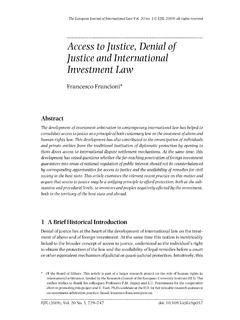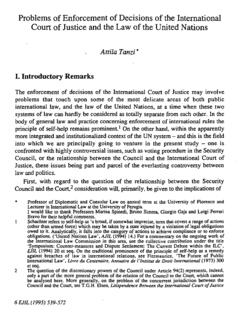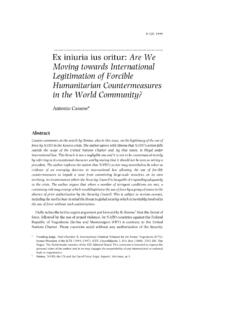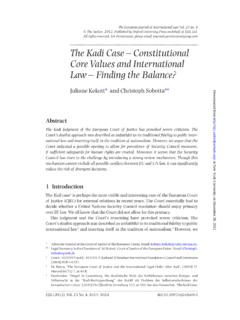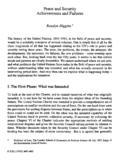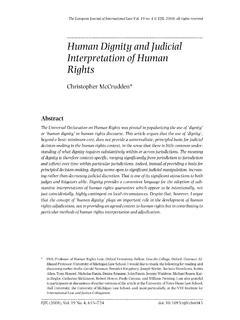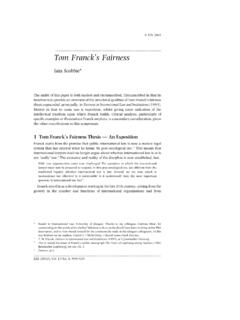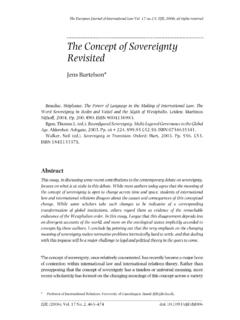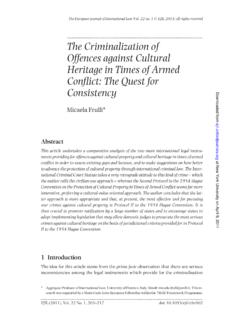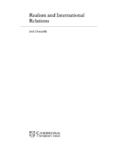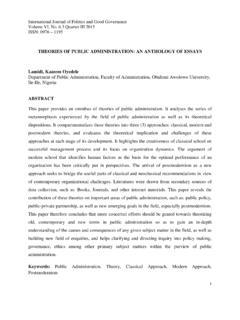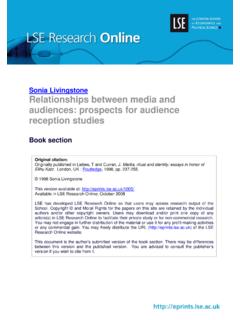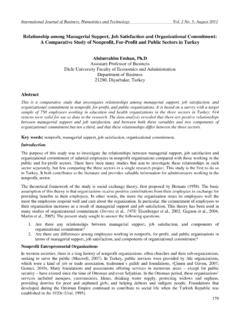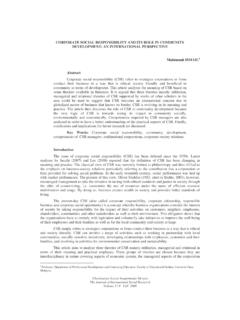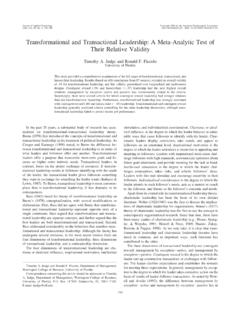Transcription of International Law and the Limits of Fairness
1 EJIL 2002*Corpus Christi College, Oxford. I am grateful to Thomas Franck for his generous reply to a version of thispaper delivered at a colloquium on his work held at the University of Glasgow on 1 June 2001. My thanksare also due to Liz Fisher, James Griffin, Anat Scolnicov, Jacqueline Tasioulas and participants at aconference held at the British Institute of International and Comparative Law on 23 March 2000 for theirvaluable comments on earlier drafts. This article was written during my tenure of an AHRB ResearchLeave source is M. Koskenniemi, From Apology to Utopia: The Structure of International Legal Argument(1989)..EJIL (2002), Vol.
2 13 No. 4, 993 Law and theLimits of FairnessJohn Tasioulas*1 Beyond Apology and UtopiaInternational legal theorists have recently popularized a vivid depictsinternational legal thought as ceaselessly engaged in an unsatisfying oscillationbetween the poles of apology and utopia. On the one hand, there is the tendencytowards apologetics, whereby legal analysis acquiesces in the norms, practices andinstitutions that have emerged through the largely unedifying processes of geo-politics. On the other hand, there is the opposing tendency to invoke ethical values in away that threatens to cast International legal reasoning adrift from any meaningfulbearing on relations between agents in the global domain.
3 And what these theoristssuggest is that this to and fro movement, which I have already termed unsatisfying, isalso unavoidable: an antinomy that is inherent in the underlying commitments ofinternational law and that threatens to break out at any moment, endangering itscoherence and stability. Hence the relentlessly downbeat quality of many critical analyses of International law, which typically elicit from their proponents one of thestudiedly non-committal attitudes of post-modernism: cool detachment, an ironicshrug of resignation, or this final leap of pessimism, as we might view it, itself seems rather consider how a proponent of the role of values in International law might danger of utopianism, he might say, is one identifiable as such only in the light ofthe adoption of an evaluative perspective.
4 Ought , after all, implies can . Thenormativity of values and norms depends upon their being suitably integrated withhuman capacities, both of individuals and groups. So the need for realism, for theavoidance of issuing utopian prescriptions that are normatively idle, is one thatemerges from within the ethical point of view itself. It is not something set over against994 EJIL 13 (2002), 993 10232 For an incisive exploration of the meanings and limitations of realism, see C. Beitz, Political theory andInternational relations (rev. ed., 1999), Part I and at 185 Rawls, The Law of Peoples(1999).4T.
5 M. Franck, Fairness in International Law and Institutions(1995), at 7 [hereinafter Fairness ].5 Ibid, at , at point of view. How far we can press the role of ethical values in International lawdepends, among other things, on a sober assessment of precisely the sort of facts thatrealists have always deemed central: the nature and durability of the state system; theimbalances of power it embodies; the motivations of, and the extent of interaction andinterdependence among, the various actors in the International sphere, and so hopeful prospect that emerges here is not of an interminable and unsatisfyingsee-saw motion between apologetic realism and na ve utopianism, but rather of analtogether happier and more stable position.
6 One that, following John Rawls, wemight call a realistic utopia grounded in psychological, socio-economic andinstitutional reality, yet expressive of an acceptable normative stance in responding tothat is precisely in this way, as a contribution to making sense of thepossibility of a realistic global utopia, that we should understand Thomas Franck simportant discussion of the role of Fairness in International law. At one level, of course,he is an unabashed idealist: a system s reach should exceed its grasp , he writes, orwhat s heaven for? 4 Nevertheless, for him the turn to Fairness is not the upshot ofna ve utopian speculation unconditioned by assessments of psychological, social andinstitutional reality, but of a favourable configuration in real-life conditions.
7 Thecontemporary International domain exemplifies what Hume called the requisite circumstances of justice . Thus, the priority Franck gives to the question Isinternational law fair? depends upon two structural preconditions for fairnessdiscourse which have increasingly come to characterize International life: moderatescarcity and community, along with the increasing maturity and complexity of theinternational legal system:we are witnessing the dawn of a new era, defined both by moderate scarcity and by anemerging sense of global community. We have not arrived there yet, but that is where we seemto be heading as we turn the corner into the third millennium.
8 Both moderate scarcity and ashared sense of community have become constant characteristics of our contemporary economic, social, and political conditions have eventuated at the same time as theinternational legal system has reached a high level of maturity and complexity. Thisconfluence of factors makes discussion of Fairness both opportune and objective in this paper is to probe the moral-philosophical underpinnings ofFairness. The problems I shall identify are explored against my background agreementwith the fundamental thesis of that book: that International law is subject to ethicalscrutiny and ought to be shaped in accordance with its deliverances.
9 As Franck puts it,emancipated from the constraints of defensive ontology the obsessive concernwith whether International law is truly law International lawyers are now free toundertake a critical assessment of its content .6My discussion is aimed, instead, atquite fundamental aspects of the way in which Franck seeks to substantiate and followInternational Law and the Limits of Fairness9957I enter a caveat here: it seems to me that Franck is too quick to dismiss as unimportantly ontological still-pressing issues concerning how a value-centred approach to International law factors into thedoctrine of that law s sources.
10 His claim, against realists, that International law already embodiesimportant standards of Fairness , a right to democratic governance, depends upon ascribing a role tovalues ( a modern secular version of natural law and rights , (at 265)) in the process of norm-formationthat is tantalizingly hinted at, but never fully articulated let alone defended. For this reason, dourscholastic issues of ontology (at 363) are not entirely superseded in the existential moment Franck aimsto on that appealing first problem, that of ethnocentrism, relates tothe statusof Fairness . In a world characterized by radical diversity in moral andpolitical practice and belief, how can Fairness be anything more than a name for aculture-specific value-construct that Franck is proposing arbitrarily to foist onadherents of other cultures through International law and institutions?
